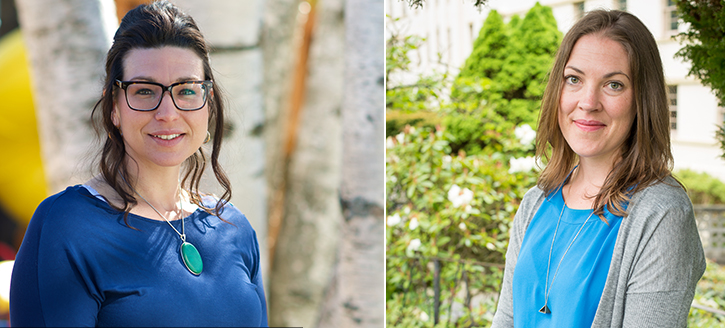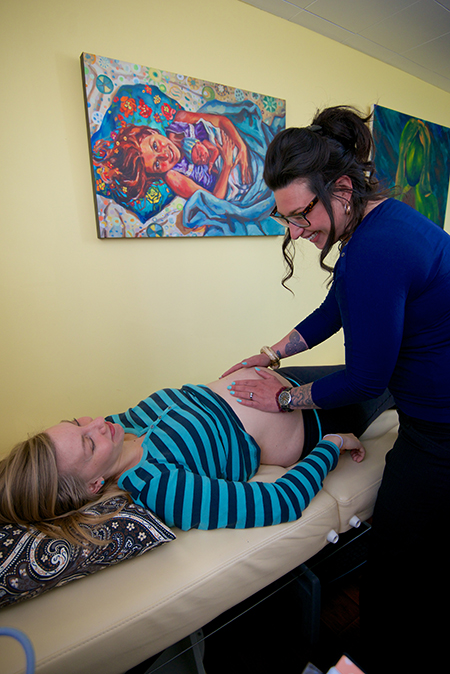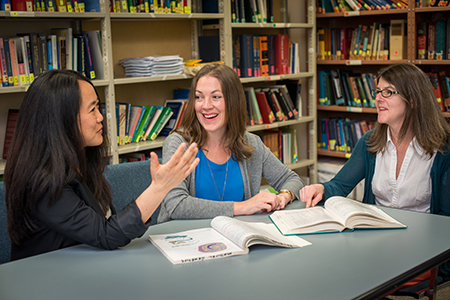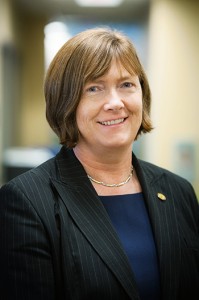
The 100th graduates of UBC’s midwifery and genetic counselling programs, L-R, Angel Resendes and Serena Talcott Baughman. Photos by Kelly Bergman and Rob Shaer.
This spring, Angel Resendes and Serena Talcott Baughman embarked on two different careers in two very different cities – Resendes as a midwife in Prince George, and Baughman as a genetic counsellor in Portland, Oregon.
But as they ascended the stage in the Chan Centre for Performing Arts to receive their UBC diplomas in May, they shared a common distinction: Each was the 100th graduate of their programs.
By virtue of the year they graduated and their place in the alphabetical order of graduates, Baughman and Resendes are walking milestones for two of the Faculty of Medicine’s newest and smallest health professions programs: Genetic Counselling (created in 1996), and Midwifery (created in 2002).
But as different as their careers and destinations may be, Resendes and Baughman actually have more in common than their centesimal status.
They were both thirty-something working mothers who returned to school long after most people have settled into their careers; they both chose very new health professions (at least new to the U.S. and Canada); and both were willing to re-locate to Vancouver from hundreds of kilometres away to earn their degrees at UBC.
For the 36-year-old Resendes, that meant living apart from her two daughters, who stayed in Prince George while she took 10 months of classes. For Baughman, it meant persuading her husband and her two daughters to leave Portland for two years.
“It was one of the hardest things I did in my entire life, being a long-distance mum,” Resendes says. “One of the things I had to tell myself was, ‘This is creating a vision for them.’ It taught them lessons about determination and courage and sacrifice, and about supporting each other when dreams come calling. In a way, I was teaching my children by being away.”

Angel Resendes, UBC Midwifery’s 100th graduate, examines expectant mother Tiffany Bonnett at a clinic in Prince George. Photo by Kelly Bergman.
A long wait for the right moment
Resendes, like most Canadians, didn’t know what a midwife was when she met one for the first time, 16 years ago. The Prince George native was visiting Vancouver Island, pregnant with her first child, when they were introduced by a mutual friend.
“She helped me understand that there was more to becoming a mother than just giving birth, that it was a spiritual journey,” she says. “It stayed with me, and a couple of years later, I had a dream that I had followed her example – it was literally a calling.”
But at that time, midwifery had just become a regulated profession in B.C., and and the province didn‘t have a midwifery education program. So Resendes chose to do the next closest thing. She earned a bachelor’s degree in nursing from the University of Northern British Columbia, then held various jobs around Prince George – working at health centres on First Nations reserves, helping people cope with mental health problems and addictions, providing prenatal care, instruction and counseling to women in challenging circumstances.
“As a nurse, I had a series of amazing experiences that gave me more to offer women,” Resendes says. “Meanwhile, my daughters became older, and UBC’s program became firmly established. So I came back to my dream.”
Embedded in Prince George
Resendes’s health care experience was so extensive that she was fast-tracked, entering in the second year of the four-year bachelor’s degree program. Still, when she arrived in Vancouver to begin her studies, she was prepared to be apart from her daughters for at least two years, while hoping that her final year of clinical placements could be completed in Prince George.
But the UBC Midwifery program, eager to have Resendes spend as much time learning the profession in the place where she would be practicing it, arranged for her to spend her third and fourth years in Prince George.
Having midwifery students learn in places beyond the Lower Mainland has long been a priority for the midwifery program, and at least one of each student’s 13-week clinical placements must be in a rural or remote location. But by embedding Resendes in Prince George for two full years, UBC Midwifery took that another step further — and, Resendes believes, prepared her well to become Prince George’s newest midwife.
“The circumstances in the North are very different from the ones in Vancouver,” she says. “We make more home visits in the North, because transportation is more difficult. And many women’s partners are often away for extended periods, working in the bush. So it was important to have my education sourced from where I come from, to learn to deal with those challenges.”
Michelle Butler, who became the Director of the Midwifery Program in January 2014, has plans to expand on that experience. This fall, eight second-year students moved to Victoria to continue their studies. Some classes, held in seminar rooms in Victoria’s two teaching hospitals, rely on videoconferences with instructors and classmates in Vancouver, while others are self-contained; their clinical placements will be on the Island.
“B.C., by allowing midwives to be the primary caregiver for women with normal pregnancies, created a superb model for how midwives function in the health care system,” says Dr. Butler, who was recruited from University College Dublin. “Our biggest challenge is providing the people to fill that role. We’re now in the process of doubling our enrollment, to 20 graduates a year. But we must also train more of them in underserved areas, so students can see how much they are needed in such places, and how rewarding it can be to fill that need.”
A “Top Ten” career
Serena Talcott Baughman’s path to genetic counselling began with a summer stint at the Oregon National Primate Research Centre in 2009.
Science had been her job for the past decade – as a teacher of basic biology to Portland ninth-graders. But the lab work, while socially isolating, was intellectually stimulating, and she wanted to find a way of combining the excitement of science with the personal interactions that are a natural part of teaching.
Her supervising researcher suggested genetic counselling. It was a new term to her, as it still is to most people. But she quickly discovered that it had been listed as one of the “Top Ten New Careers” by U.S. News and World Report.
Baughman soon discovered what this new profession was all about: helping people understand the implications of a diagnosis or test results of genetic disorders. In some cases, counsellors advise parents – those with genetic conditions who are considering having children, or are expecting a child at risk of having an inherited condition, or have a child born with an inherited condition. In other cases, counsellors help adults make sense of their own diagnoses or test results. Sometimes, a genetic counsellor winds up working with an extended family whose members might share a genetic trait.
“As a teacher, genetics was always the subject we spent more time on, because of the ethical questions, the family stories, the relevance to the kids’ personal lives,” she said. “It was my favourite part of the school year, and I think it was the kids’ favourite part, too. I just didn’t know that anything existed that so perfectly blended human genetics and the opportunity to hear people’s stories and facilitate decisions.”
Two job offers before graduation
She soon found herself taking science courses at Portland State University and Portland Community College, shadowing genetic counsellors, and volunteering as a crisis counsellor – all pre-requisites for a genetic counselling program.
UBC’s two-year master’s program was the closest one to Portland. From a group of about 100 applicants, Baughman was one of the six students admitted each year. (The program is funded entirely by tuition, so it admits students regardless of where they live.)

L-R: Tracey Oh, Genetic Counselling Co-Director; Serena Talcott Baughman, the program’s 100th graduate; Jenna Scott, Co-Director. Photo by Rob Shaer
Based at BC Women’s Hospital and Health Centre, UBC’s program is one of only four in Canada, and the largest. It was championed by Jan Friedman and Dessa Sadovnick, Professors in the Department of Medical Genetics, and was led for its first years by Anita Dircks, a Clinical Assistant Professor. It’s now led by two co-directors, Clinical Instructor Tracey Oh and Clinical Assistant Professor Jenna Scott.
Considering the rapid advances in genetics during the past two decades (the human genome’s rough draft wasn’t announced until 2000, four years after the program’s creation), the curriculum has been in a constant state of evolution. Students are now prepared for the possibility of genetic counselling specialties – in cancer, for example – that didn’t exist when the program was first created.
“Our graduates are still ready to do any job,” Oh says. “We give them the tools to adapt, because genetics is changing all the time.”
Baughman is a testament to that preparation – the week before graduation, she received two job offers in Portland. She and her family are heading back there, where she will become a counsellor at a fertility clinic, advising patients about pre-implantation genetic screening and diagnosis, the implications of having children at an advanced age, genetic screening results and family histories, and genetic causes of infertility. She will also help screen sperm and egg donors.
“I’m helping a diverse patient population, many of whom travel to this clinic from all over the world, seeking help in starting a family,” she says.
